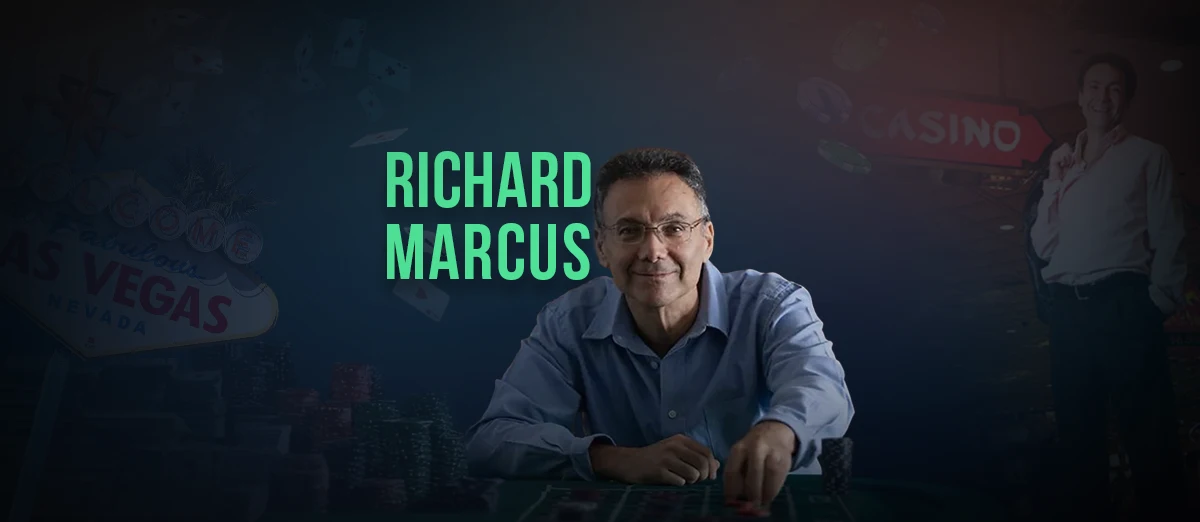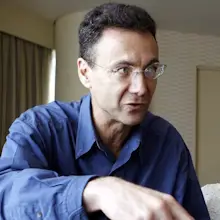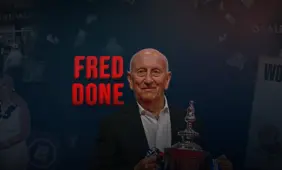Richard Marcus - The Casino Cheat Who Became a Gaming Security Icon

The name Richard Marcus ripples around the world of casinos, not as a player in their midst but rather for legendary status in casino cheating.
- In this article
- Highlights
- Beginnings
- Career
- Richard Marcus Net Worth
- Where Is He Today?
- FAQ
Determined and fearless, he made moves in many brick-and-mortar casinos for 25 years, always one step ahead of casino security and booking wins that were not left to chance.
An early brush with loss set him ablaze, and Richard Marcus net worth, therefore, reflects the rewards of complex schemes that shifted the odds in his favor, often leaving casino staff baffled.
Throughout his career, Marcus' strategies were not short of genius. Perhaps one of the most famous tricks, known as the "Savannah move," was iconic for its audacity and precision.
Throughout his many years in casinos, from one corner of the world to another, Marcus was never found guilty of a card cheating or other related crime. Instead, his name grew, and he began sharing his knowledge with the world.
Later, he turned into an anti-cheating consultant, considered respectable, training casino staff in spotting deception so one may avoid scams. He now unites top experts and executives in casino security as the founder of the Global Table Games and Game Protection Conference in Las Vegas.
Marcus' work and books, such as American Roulette and Dirty Poker, have turned him from a notorious cheat into one of the great protectors of the game and a unique place in casino history.
Richard Marcus Highlights

- Invented the “Savannah Move” – A scam hiding high-value chips under low ones for big payouts
- Perfected “Pastposting” – Swapped low-value bets for high ones after winning
- Never convicted – Avoided prison time despite his notorious scams
- Founded Global Game Protection Conference
- Won an estimated $25 Million – Scams brought in millions from casinos across the world
Early years and Upbringing of Richard Marcus
Richard Marcus grew up in New Jersey with a love for competition, starting with his impressive baseball card collection—the largest in his neighborhood.
But one fateful day, Marcus lost his entire collection in a poker-style card-flipping game, where matching colors to teams decided the winner.
Frustrated by his repeated losses, Marcus eventually realized that two players were rigging the odds. The shock of losing his prized collection to cheats fueled a desire for payback, sparking his early fascination with beating the system.
Determined to turn the tables, Marcus began devising clever little swindles of his own. He and a friend would bet on which cars would appear around the corner, with high odds for rare models like a Mercedes or BMW.
With a perfect setup, Marcus’s friend’s brother would drive by in a Mercedes just as the bets were placed, winning big each time. This knack for orchestrating scenarios would eventually cement his reputation as a master of deception.
Richard Marcus’s First Taste of High-Stakes Gambling
Marcus’s casino cheating jorney began with a stroke of beginner’s luck—and a massive win at just 17 years old. He took a few hundred dollars to the Roosevelt Racetrack and decided to place some trifecta bets.
After spouting off random numbers without even knowing what they represented, he ended up with three winning tickets worth $7 each, totaling more than $20,000.
This was more money than Marcus had ever imagined at his age, but he quickly ran into a problem: how to cash in those winning tickets without an ID, which was legally required for payouts that exceeded a certain threshold.
Marcus struck a deal with a friendly security guard, agreeing to a 10% fee in exchange for cashing the tickets. With this newfound fortune, Marcus bought a Mustang convertible and headed to the iconic Las Vegas strip, despite being under the legal gambling age.
Through some connections and a bit of charm, he managed to book a suite at the Riviera Hotel, securing $20,000 in the casino’s money cage and living lavishly. From $200 dinners to luxurious desserts, Marcus felt on top of the world, convinced he’d continue this high-rolling lifestyle indefinitely.
During his stay, Marcus fell in love with baccarat, a game that drew international crowds. He turned his $20,000 into $100,000 within just five days, dreaming of endless wealth.
But on his 18th birthday, his fortunes reversed. He lost everything, eventually even selling his Mustang for $1,500, which he also gambled away. Left penniless in the 115-degree heat of Las Vegas, Marcus found himself homeless, sleeping under an overpass for weeks.
Richard Marcus’s First Steps into Casino Scams
After losing everything in Las Vegas, Richard Marcus found himself working as a baccarat dealer at the Four Queens Casino and Hotel, barely scraping together enough to survive.
But this all changed when he was approached by Joe Classon, a well-known casino cheat who saw potential in Marcus and decided to recruit him. Intrigued, Marcus accepted, bringing his deep understanding of baccarat to the table.
His first move was bold: a false shuffle. By manipulating the shuffle to keep a series of cards in a predictable order, Marcus could determine exactly which hands would win. This tactic gave his new team a massive edge.
On their first run, Marcus’s setup brought in $30,000 without raising any suspicions. With Classon’s team, Marcus mastered this and other scams, working with a carefully orchestrated group across the globe.
Pastposting Scam: Richard Marcus’s Most Daring Move
Richard Marcus mastered the art of “pastposting”—a deceptive late-betting technique that guaranteed winnings by making or altering bets after the outcome was known. Working alongside Joe Classon’s team, Marcus refined this casino scam to near perfection, creating a seamless system that allowed them to win undetected.
The pastposting strategy involved placing a modest initial bet, like three $100 chips, on a blackjack hand. After the hand won, Marcus would discreetly replace those black chips with two hidden $5,000 chips, keeping a $100 chip on top for plausible deniability.
With a quick tap on the dealer’s hand, he would claim, “Hey, you paid me wrong!” while exposing a stash of backup $5,000 chips concealed by his elbow. This psychological ploy was powerful; by giving the impression of a high-roller with $50,000 in chips, he convinced the dealer that he was a serious player who’d been mistakenly paid short.
Inventing the Savannah Move
The peak of Richard Marcus’s gambling career came when he invented a move that would become legendary in the casino world: the Savannah move.
This ingenious scam involved hiding a high-value $5,000 chip underneath a low-value $5 chip, slanted just enough to obscure the more valuable chip from the dealer’s view.
If the bet won, Marcus would reveal the hidden chip, collecting a hefty payout of $10,010. If it lost, he would swiftly replace the stack with two $5 chips, limiting his loss to just $10.
Marcus first tested this concept in a downtown Las Vegas casino. He started small, hiding a $100 chip beneath a $1 chip on a roulette table, angling it so the dealer would mistake the stack for a mere $2 bet.
To his surprise, the dealer didn’t spot the higher denomination chip, even though Marcus was certain it would be noticed. This successful trial was the proof he needed: his technique would work on a larger scale with $5,000 chips.
Perfecting the Savannah move took timing, finesse, and a keen understanding of human psychology. Marcus would time the switch to coincide with moments when the dealer and pit boss were momentarily distracted, often with the help of an accomplice, like Savannah, a Vegas stripper after whom the move was named.
The swap was swift, subtle, and remarkably natural-looking, blending into the usual bustle of the casino floor. If anyone noticed, Marcus would simply act drunk and innocent, dismissing it as a mistake.
Quitting While Ahead
By the mid-1990s, Marcus became a ghostly presence in casinos. His tactics were well-known among backroom security teams but nearly impossible to catch.
Casinos were ramping up their defenses, employing sophisticated surveillance systems and facial recognition technology to track potential cheats. With his signature moves attracting more attention, Marcus recognized that his once-dependable strategies were now a high-stakes gamble.
A pivotal moment came in 1995 when a routine play at the Golden Nugget didn’t go as planned. After winning a substantial bet, Marcus was informed by the casino president that his winnings would not be honored.
This direct confrontation signaled a shift—Marcus could sense that his usual freedom was fading, and the industry was closing in. Realizing that the odds were stacked against him, Marcus began to pull back. He and his team transitioned to less frequent operations, moving their cons across various locations to avoid familiar eyes.
But the growing pressure, increased scrutiny, and the risk of legal consequences ultimately led him to step away entirely. By New Year’s Eve in 1999, Marcus officially retired from the world of casino cheating.

"The three ingredients of being a professional casino cheat, a successful one are: one – brains, intelligence; two – balls, courage, lack of fear; three – and as equally important as the other two, is lack of greed, knowing when to stop. That’s, in a nutshell, what it is."
Richard Marcus Net Worth and Winnigs
Richard Marcus net worth is a reflection of his 25-year career as a professional casino cheat, a path that allowed him and his team to accumulate millions. Over his career, Marcus and his team cheated casinos out of an estimated $25 million.
However, luxury travel and living expenses in casino hotspots worldwide—Puerto Rico, the Bahamas, Monte Carlo, and Las Vegas—ate into those earnings, with around 40% spent on maintaining their lifestyle.
Today, Marcus continues to earn through book sales, consultancy work, and appearances at industry conferences, where he shares his knowledge on game protection and the art of deception.
Currently, Richard Marcus net worth is estimated to be around $2 million.
Where Is Richard Marcus Today?
Today, Richard Marcus has left his days as a notorious casino cheat behind and transformed himself into a respected authority on gaming protection.
After sharing his exploits in a series of revealing books, including American Roulette: How I Turned the Odds Upside Down and The Great Casino Heist, Marcus turned his unique experience into a career as a gaming protection consultant.
His firsthand knowledge of casino scams captured the attention of the industry when he spoke at the 2007 World Game Protection Conference, where he provided an insider’s view of professional cheating.
Since then, Marcus has helped casinos worldwide improve their defenses against organized cheats, training staff on the methods and psychology of professional players like himself.
As a consultant, he offers insights few others can, drawing from his dual experience as both a former cheat and an expert in game protection.
In 2022, Marcus expanded his influence by launching the Global Table Games and Game Protection Conference, bringing together top experts to educate casino staff on the latest in gaming security.
FAQ
What Is Richard Marcus Net Worth?
Richard Marcus net worth is estimated to be around $2 million. His fortune comes from years of casino scams, as well as his later career as a gaming protection consultant, author, and speaker at industry conferences on casino security and game protection.
What Is Richar Marcus Famous For?
Richard Marcus is famous for his ingenious casino cheating techniques, including the creation of the "Savannah move." His methods enabled him to outsmart casino security for decades, making him one of the most successful and notorious casino cheats in history.
Did Richard Marcus Go to Prison?
Despite his extensive cheating career, Richard Marcus never served prison time for his scams. His skillful tactics and carefully planned moves kept him under the radar, allowing him to retire from the casino-cheating world without facing criminal charges.
How Did Richard Marcus Cheat Casinos?
Richard Marcus used techniques like “pastposting” and his signature "Savannah move," hiding high-value chips beneath low-value ones. If the bet won, he would reveal the hidden chip for a large payout; if it lost, he discreetly removed it, limiting his losses.





Review this Blog
Leave a Comment
User Comments
comments for Richard Marcus - The Casino Cheat Who Became a Gaming Security Icon